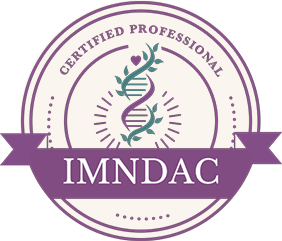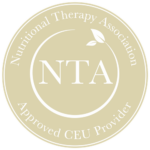
EARN 25 CE CREDITS IN NUTRITION

HELP YOUR CLIENTS LIVE A JOYFUL LIFE AGAIN

GROW YOUR PRACTICE
To Prevent or Reverse Diabetes Type 2 and Alzheimer’s, Medication and Traditional Therapy Are Not Enough
What most clinicians don’t know is that the two diseases are interrelated — so much so, that Alzheimer’s Disease is now called Diabetes Type 3.
With both conditions, stress disrupts blood glucose, and cortisol destroys neurons in the brain.
What’s more, if you work with clients in their 40s, 50s, 60s, or older who have PTSD, trauma or depression, your clients are at heightened risk of cognitive decline, diabetes, and Alzheimer’s disease — but they probably don’t even know it.
With an Integrative Approach, You Can Help Prevent or Reverse Your Client’s Diabetes Type 2, and Slow or Reverse the Progression of Alzheimer’s and Dementia
MORE ABOUT THE COURSE

Follow Emerging Evidence
You can help prevent or reverse Diabetes Type 2, and — as emerging evidence also has shown — you can even help slow and in some cases reverse the progression of Alzheimer’s and dementia.

Prevent Havoc on Your Clients
The good news is that small choices your clients make in their daily lives can lead “downstream” to meaningful gains in their functioning and prevent the havoc that these diseases wreak on body and mind.

Connect Mind and Body
By understanding the relationship of mind and body, including how diet can boost or dampen mood and help or hinder metabolism, you can become an even more valuable guide to your clients on the road to health.

Induce Deep Healing
As an expert in integrative medicine and nutrition for mental health, I’ve spent my career researching, refining, and selecting evidence-based methods for thousands of individual clients that work synergistically to induce deep healing and restore mental and emotional balance.

Make Significant Health Gains
In this exclusive, online certification training, you’ll discover how to use the Brainbow Blueprint® to achieve significant health gains for your clients that will ripple through their lives and positively affect their families and communities.

Get Strategies and Tools
This training is based on my four decades of research and experience and provides evidence-based strategies and tools you can start to use right away to help your clients resolve stressful symptoms today — and avoid the pitfalls of cascading health problems in the future.
An Integrative Approach to Mental Health is the Future of Your Profession
This certification provides you with comprehensive training in state-of-the-art methods to prevent Diabetes Type 2 and Alzheimer’s and treat the whole person using evidenced-based methods that are designed to integrate seamlessly and safely into your current practice.
Once you complete this training, you’ll qualify to immediately become an Integrative Medicine and Nutrition for Diabetes and Alzheimer’s Provider (IMNDAC) through the Leslie Korn Institute for Integrative Medicine.

Try Before You Buy
See if this certification program is the right fit for you. Click the button to start your first lesson.
No credit card required. It’s 100% on me!
Your Course Includes:
- An invitation to join my Live Advanced Applications program (coaching and case consultation)
- Your first year of certification is FREE (a $99.99 value)
- Your exclusive listing in our Referral Network
- Practical videos and handouts to use with your clients
- Nutritional recipes for your clients
- Multiple case reviews
- Clear assessment demonstrations


"I have just completed the Mental Health Disorders certification course. Wow. Your work and teaching are exquisite, so deeply resonant with my sensibilities and interests. I'm so grateful to have come upon you on my path!”
Nadine Laughlin, APRN

"Thank you for all the brilliant information you shared. Your classes always inspire me to keep learning.”
Patrice French, RNP

“This course provided a very in-depth and multifaceted perspective, education, and information. I am very satisfied that I took this course, I feel able to deal with Diabetes Type 2 and Alzheimer’s from a totally different angle and to use different approaches than I did in the past. Thanks Dr. Korn, this was another great course. "
Carmen D. Drăgan, RD, LDN, IFNCP, CMHIMP, CLT

“She has mastered the integration of the latest science and skillfully mentors other professionals. I highly recommend her courses and her books!"
Gray L. Graham, BA, NTP
Frequently Asked Questions
This certificate program is designed for nurses, nurse practitioners, PAs, PTs, OTs, psychologists, social workers, marriage and family therapists, professional counselors, nutritionists, massage therapists, psychiatrists, and other professionals for use in the clinical setting.
The course is also very accessible to non-professionals if you have an interest in your own health and well-being.
There is no known commercial support nor conflict of interest for this program.
We are a Preferred Provider with the Integrative and Functional Nutrition Academy (IFNA). The certification course “Nutrition and Integrative Medicine for Diabetes, Cognitive Decline, and Alzheimer’s Disease” is approved for 25 Continuing Professional Education Units (CPEUs).
Once you complete your certification you may maintain this record and submit it to IFNA when required.
You may also check about submitting our certificate of completion directly for RD and Nutritional CPEUs to your local credentialing body. We encourage you to learn about your specific credentials requirements in advance.
We are a Preferred Provider with the National Association of Nutrition Professionals (NANP). The certification course, “Nutrition and Integrative Medicine for Diabetes, Cognitive Decline, and Alzheimer’s Disease” is approved for a total of twenty-five (25) NANP Category I CEUs.
Once you complete your certification you may maintain this record and submit it to NANP when required.
You may also check about submitting our certificate of completion directly for RD and Nutritional CEUs to your local credentialing body. We encourage you to learn about your specific credentials requirements in advance.
We Are a Preferred Provider with The Nutritional Therapy Association (NTA). The certification course, “Nutrition and Integrative Medicine for Diabetes, Cognitive Decline, and Alzheimer’s Disease” is approved for a total of twenty-four (24) health CEUs.
Once you complete your certification you may maintain this record and submit it to NTA when required.
Accessibility Policy: This program adheres to the standards of the Americans Disabilities Act. Please contact the Leslie Korn Institute for Integrative Medicine if special accommodation is required.
Grievances Policy: Leslie Korn Institute for Integrative Medicine seeks to ensure equitable treatment of every person and to make every attempt to resolve grievances in a fair manner. Please submit a written grievance to grievances_lkkim@protonmail.com. Grievances would receive, to the best of our ability, corrective action in order to prevent further problems.
1. Describe integrative medicine and functional medicine for diabetes prevention management and treatment.
2. Describe integrative medicine and functional medicine for cognitive decline and Alzheimer’s prevention management and treatment.
3. Analyze definitions and terms of reference in the field of practice.
4. List the benefits of integrative medicine.
5. Discuss the link between culture and Complementary and Alternative Medicine (CAM).
6. Identify the principles of effective treatment.
7. Apply the spectrum of ethics into clinical practice of integrative medicine.
8. Assess federal & state laws and scope of practice.
9. Identify the importance of exploring belief systems in a cultural context.
10. Describe the role of ethnic identity, practices, physical & mental health in ethics
11. Describe Metabolic syndrome (prediabetes) and diabetes, type 1, type 2, and 3.
12. Describe emerging definitions of diabetes (type 1, 2, gestational and 3).
13. Identify risk factors and the relationship among them.
14. Identify risk factors and the relationship among them.
15. List complications & comorbidities of diabetes.
16. Identify the spectrum of cognitive decline & Alzheimer’s development.
17. Identify the difference between mild, subjective cognitive impairment and AD.
18. Describe APOE, plaque tangles, and neuroglial inflammation.
19. Discuss epigenetic and genetic (APOE) vulnerabilities for the development of heart disease, and its relation to diabetes type 3 (dementia) and lifestyle guidelines for prevention.
20. List how amyloid and Tau are currently understood to affect cognitive function.
21. Identify how chronic stress affects the immune system.
22. Discuss how stress can impair the cardiovascular system.
23. Discuss how stress increases the risk of Alzheimer’s.
24. Identify the bidirectional effects of psychology & biology.
25. Discuss the link between diabetes, anxiety, and depression
26. Discuss the effects of adverse childhood experience, PTSD on health.
27. Analyze the evidence of insulin resistance and its response to emotion.
28. Discuss the health risks for caregivers of diabetes and dementia.
29. Identify strategies for enhancing caregiver stress resilience.
30. Describe the science of circadian rhythm and its assessment as it contributes to diabetes and AD spectrum.
31. Describe the role of stress in circadian rhythm disruption.
32. Describe the effects of a disrupted circadian rhythm on health.
33. List methods to balance circadian rhythm.
34. Assess the role of hormones in cognitive performance, diabetes & AD prevention.
35. List the primary hormones, methods of use, and their interactions.
36. Explain the evidence of benefits of the use of Bioidentical Hormone Replacement Therapy.
37. Analyze differentials in prevalence of diabetes & Alzheimer’s across diverse communities.
38. Identify approaches to cultural competent care.
39. Describe intervention options in the context of culture and ethnicity.
40. Identify the importance of identity awareness as a tool to be more efficient with patients.
41. Demonstrate and interview clients using the DSM5™ Cultural Formulation tool to explore beliefs about diabetes in order to enhance the treatment planning process across cultures.
42. Describe innovative approaches to diabetes diets and interventions among diverse groups including African Americans, Hispanic individuals, American Indians.
43. Describe concepts of culinary pedagogy.
44. Analyze traditional foods and their benefits for health and rapport building.
45. Assess your client/patient for readiness for diverse Integrative Interventions.
46. Demonstrate the use of a food mood assessment to evaluate client eating patterns and how those patterns may influence their food behaviors and diabetes progression (Slide 24).
47. Demonstrate lesser known salivary, stool and hair assessments that will inform dietary and nutritional interventions including Adrenal Stress (cortisol, DHEA), Tissue Mineral Analysis, Gastrointestinal health, Food sensitivities.
48. Assess circadian rhythm as it contributes to diabetes and AD.
49. Describe drug-nutrient-herbal interactions for clients in order to prevent side effects of polymedicine use.
50. Discuss epigenetic and genetic (APOE) vulnerabilities for the development of heart disease, and its relation to diabetes type 3 (dementia) and lifestyle guidelines for prevention.
51. Assess the role of ACE’s and increased risk of diabetes and AD.
52. Assess the bi-directional interaction of mental health status on diabetes self-management.
53. Identify hormones assessment options and their influence on diabetes.
54. Identify the scientific research that links diverse types of diet diabetes and its implications for treatment.
55. Explain The BrainBow Blueprint for Diabetes and AD.
56. Analyze the science of the “second brain” and its function in the prevention and development of diabetes type 2 and AD.
57. Identify the Delta Desaturase Enzyme, fat digestion, and its meaning for diabetes and diet.
58. Recite Bioindividual nutritional approaches to diabetes prevention and treatment and why one diet does not fit all?
59. Identify the link between oxidation of carbohydrates, genetics, culture, and diet.
60. Identify a correlation between the role of food sensitivities and diabetes type 2 and AD.
61. Identify the role of culinary medicine in addressing hypoglycemia, hyperglycemia, neuropathies and cognitive health.
62. Identify the application of spices for prevention and treatment of diabetes and AD
63. Discuss nutritional approaches for preventing and treating metabolic syndrome and diabetes.
64. Describe nutritional approaches and food preparation methods for preventing and treating AD.
65. Identify the role of fermented foods in enhancing the second brain.
66. Describe the role of anti-inflammatory spices for prevention of cognitive decline
67. Identify the culinary application of bio-individual diets Discuss the integration of herbal therapies into treatment protocols for those with diabetes type 2 and 3 diagnosis
68. Explain evidence-based herbal protocols for approaching the treatment of diabetes type 2.
69. Explain potential contraindications of herbal medicine in relation to particular populations of patients.
70. Identify seven herbs that are hypoglycemic in action.
71. Describe five herbs used for cardiovascular support.
72. Discuss the use of three herbs for liver health.
73. Identify herbs for adrenal health as it relates to metabolic disorders.
74. Identify five herbs that support the nervous system.
75. Identify three herbs indicated for neuropathy associated with type 2 diabetes.
76. Explain the use of essential oils as adjuvant therapy.
77. Describe use of herbal oils and salves as topical treatment for diabetes type 2.
78. Plan development of herbal protocols for those with diabetes type 2 diagnosis.
79. Discuss indications and contraindications of the use of diabetes medications and herbal medicines and nutrients.
80. Identify herbal quality and delivery systems
81. Explain how specific micronutrients and macronutrients affect blood glucose metabolism inflammation and cognitive function in clients.
82. Identify the evidence for the use of essential fatty acids for prevention and treatment of metabolic syndrome, diabetes, and AD.
83. Identify the evidence for the use and dose of essential fatty acids for diabetes.
84. Assess the evidence for specific nutrient protocols for prevention and treatment of diabetes including glucose management, Diabetic neuropathy, cardiovascular health, blood pressure, non-alcoholic fatty liver disease, etc.
85. Recite nutritional approaches for preventing and treating metabolic syndrome.
86. Describe six foundation nutrients for treating clients who present with diabetes and AD and its sequelae.
87. Identify multiple ways (oral topical etc.) nutrient absorption can enhance diabetes outcomes.
88. Describe Pharmacokinetics and Pharmacodynamics.
89. Describe synergy and additive effects.
90. Analyze drug/Nutrient/Herb interactions in Diabetes and AD.
91. Identify the research on the side effects of diabetes medications and the role of nutrition and herbal medicines.
92. Identify the research on side effects of AD medications and the role of nutrition and herbal medicines.
93. Describe Nootropic medications.
94. Describe the role of IV therapy.
95. Analyze the controversies about the use of statins.
96. Demonstrate methods to reduce and eliminate pharmaceuticals is possible.
97. Compile research on anaerobic, aerobic exercise, and self-care methods to reduce insulin resistance, improve cardiac function and reduce pain in diabetes.
98. Demonstrate the role of right hemisphere left hemisphere coordination exercises for cog function and AD.
99. Demonstrate specific stretch exercises for the spectrum of diabetes.
100. Describe specific ways for a client to create a home gym and undertake exercise at all stages of function.fx
101. Demonstrate breathing and simple chair yoga exercises designed specifically for diabetes type 2 and its sequelae.
102. Demonstrate a Guided visualization exercise and provide an audio Diabetes Guided Relaxation Audio to reduce stress.
103. Identify the evidence for the role of Manual Therapies, and Electro-therapeutic/stimulation interventions for diabetes and AD.
104. Describe Manual therapies in glucose control, mood lability, edema, relaxation, and pain management.
105. Demonstrate a Massage therapy Protocol Treatment for Diabetes.
106. Discuss the role of skin brushing and the Lymphatic system to reduce edema.
107. Demonstrate a self-massage therapy Protocol Treatment for clients with diabetes.
108. Describe Topical herbal massage oils for use in foot care in diabetes.
109. Assess the evidence for acupuncture and acupressure in diabetes.
110. Describe evidence for use of Cranial Electrical stimulation for diabetic neuropathies.
111. Identify Hydrotherapies for diabetes including, use of warm and cool water for pain, stimulation mood, foot soaks, tub soaks, delivery of minerals and relaxation.
112. Identify the science of toxins and their role in diabetes and AD.
113. Analyze the purpose of Detoxification, also called Biotransformation.
114. Identify Detoxification Strategies.
115. Analyze the role of detoxification in culture and religion.
116. Explain Phase 1, 2 & 3 Liver detoxification.
117. Identify P450 enzymes and their role in drug and herb metabolism.
118. Explain how to enhance liver function and fat metabolism, with detoxification strategies at all stages of prevention and treatment.
119. Describe tailoring lifestyle changes for clients that enhance self-care strategies and success.
120. Assess readiness for change through different motivational strategies.
121. Describe strategies to overcome obstacles to program adherence.
122. Identify learned helplessness and depression as it contributes to lack of self-care.
123. Describe methods to Motivating change in patients and family members.
124. Identify strategies for affordability and access of resources.
125. Critique concepts of social justice and community health.
126. Design integrative protocols to treat diabetes and most common comorbidities, AD, and cognitive decline.
Certification is easy and simple. Start with completing one of my three certification programs. As a licensed provider, once you successfully complete a program and achieve a minimum of 75% on the post-test, you may submit your application for certification.
It’s free for the first year.
If you are not licensed but believe that your background and work qualify you for certification, we offer an alternative pathway by which to apply. Use the same process above; in the application form, you will be asked to upload additional supporting materials.
And of course, our staff is available to support your application submission should any questions arise; just contact us.
There are options to work with me directly.
You may choose a Health Consultation for your own health and to see how to conduct the Brainbow Blueprint® model in practice.
I also offer Practice Building and Career Counseling to think through your career goals in integrative medicine and nutrition for mental health.
Whatever way you prefer to connect with me, know that I am passionate about supporting you and your personal and professional goals!
You can start the course immediately! It is a completely self-paced online course — you decide when you start and when you finish. Once you have completed the course you can claim CE credits and apply for your free certification.
How does lifetime access sound? After enrolling, you have unlimited access to this course for as long as you like — across any and all devices you own.
If you are not 100% satisfied with this course you may send an email and you will be provided with a full refund, no questions asked. The reimbursement given will be minus taxes and fees paid.
You wish you could really help your trauma clients prevent or reverse Diabetes Type 2 and Alzheimer’s…

The Curriculum Covers In-Depth…
- Introduction to Integrative Medicine and Nutrition
- Ethics and Scope of Practice
- The Biology of Diabetes and Alzheimer’s
- The Psychology of Diabetes and Alzheimer’s
- Circadian Rhythms and Hormones
- Culture, Illness, and Awareness
- Assessment and Evaluation
- Digestion and Diet
- Culinary and Spice Medicine
- Herbal Medicine and Diabetes
- Nutritional Supplements
- Pharmaceuticals and their Interactions with Herbal Supplements
- Exercise and Movement for Diabetes & AD
- Home Exercises
- Somatic and Energy Therapies
- Massage and Bodywork for Diabetes & Alzheimer’s
- Detoxification Strategies
- Self-Care, Self-Regulation, Adherence
- Protocols & Next Steps
- Resources
What’s My Investment
COURSE & CERTIFICATION
$199
$999
Join the 35,000+ professionals who completed Dr. Korn’s certification programs
I’VE BEEN FEATURED, INTERVIEWED, OR PROFILED IN:







Course Description
This certification provides you with comprehensive training in state-of-the-art methods to prevent illness and treat the whole person using evidenced-based methods that are designed to integrate seamlessly and safely in your current practice. This course gives you the tools to enhance and expand your current practice so that you become an expert in the emerging field of integrative medicine and nutrition.
Whether you are a mental health clinician working with clients who have chronic illnesses like memory loss, and cognitive decline, or a physical health or nutrition provider preventing diabetes and dementia, who wants to add to your toolbox, you will find methods that ensure your patient outcomes will improve.
You will learn an integrative approach that equips you with the knowledge, skills, and tools to combine evidence-based clinical methods using functional medicine, culinary and herbal medicine, naturopathic medicine, massage, and visceral manipulation, yoga therapies, and psychological methods with conventional, allopathic, biomedical science and clinical interventions.
This certification gives you what you require to safely recommend supplements and herbs and to help clients reduce or optimize current medications. You will study the role of traumatic stress and how it affects memory and cognition, and you’ll spend time in the kitchen learning to prepare herbs and foods.
We can give our best advice to clients and patients, but without adherence to the protocols, any method will fail. Therefore I explore the role of motivational interviewing to address self-care and compliance.
Memory loss, agitation, gastroparesis, neuropathy, sundowning, and much more are all explored in depth using natural medicine and functional methods that reduce side effects, thus giving you many options for helping your patients or clients. You’ll also explore caregiver health, cultural and social justice, and how to build rapport with cultural competency.
When you complete this integrative medicine program you will join others leading the revolution in integrative medicine and nutrition for chronic illness.

Your Instructor
Dr. Leslie Korn is a renowned expert in integrative medicine for the treatment of trauma and its physical sequelae including chronic digestive illness, insomnia, pain, substance abuse, diabetes, cognitive decline and “unexplained illnesses.” She has provided over 65,000 hours of clinical care integrating psychotherapy and somatic therapies with nutritional, culinary, and herbal medicine. She completed her training at Harvard Medical School and The Harvard School of Public Health. She is licensed and board certified in 4 clinical disciplines.
She has been a faculty instructor at Harvard in the department of psychiatry and faculty at 2 Naturopathic medical schools. She lived for 25 years in the jungle of Mexico, where she worked alongside indigenous healers and directed a pro bono health center. Her clinical practice focuses on helping clients who are ill by restoring their health and reducing or eliminating medications.
Her mentoring practice focuses on helping clinicians create a successful, integrative medicine, trauma-informed career. Her ethic of compassion and care is informed by feminist values of social justice and her love for dogs.
Licensure: LMHC, MA. Lic #3214, exp. 12/2023; NPI: 1629659636
The Leslie Korn Institute For Integrative Medicine is neither a regulatory nor licensing organization and therefore not sanctioned to certify, license, or otherwise bestow the legal authorization to practice as a nutritionist, physician, or mental health professional. Certification does not warrant that a program or its examination certifies a candidate’s competence. Nothing about this program or its examination is intended to replace, override, or conflict with licensing requirements for health professionals and their requirements for practice in their state of residency and practice.

Become a Certified Integrative Medicine Provider in Diabetes Type 2, Cognitive Decline, and Alzheimer’s











